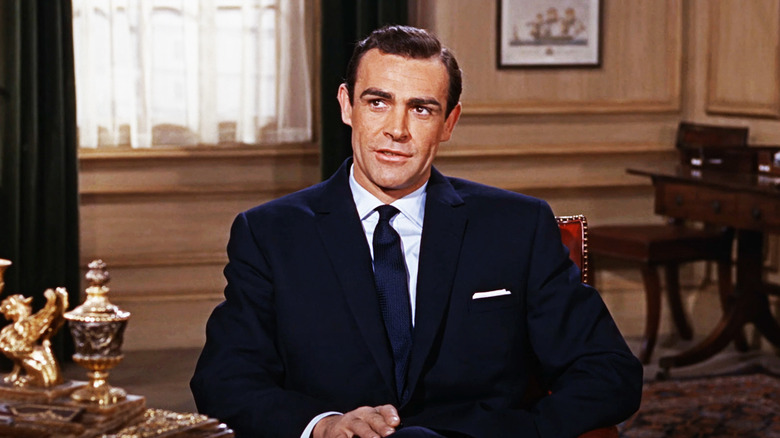
Eon Productions
Kids, there was a time when you could actually own the media you loved. Long before the rise of subscription models shackled art to the servers of multinational tech corporations, we all went out and bought movies and music, amassing treasured collections and cluttering our living rooms with unsightly plastic cases in the process.
But while everyone who grew up in the pre-streaming days piled up CDs, DVDs, and VHS tapes, there were plenty of physical formats that never quite took off. Take Laserdiscs, which had an undeniably cool name but were never all that popular — at least in the United States where they first hit the market in 1978. Physically, Laserdiscs looked like large CDs but were two-sided and could hold between 30 and 60 minutes of footage per side. A precursor to DVDs, these vinyl-sized optical discs were touted as superior to VHS tapes but for a variety of reasons — prohibitive pricing and the inability to record TV among them — the format never became all that popular.
But that doesn't mean the rise and fall of the Laserdisc was entirely inconsequential. For one thing, we would never have goten some candid James Bond commentary tracks that caused the first three James Bond Laserdiscs to be recalled from sale.
The James Bond commentary tracks lost to time (and censorship)
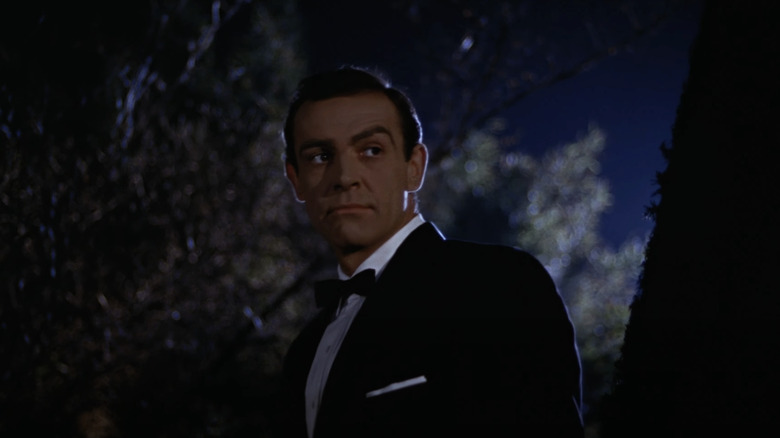
Eon Productions
As physical media formats come and go they reliably leave lost media in their wake. There are, for example, several films only available on VHS that are very much worth watching. But there's also "special features" to consider. With the arrival of DVDs, bonus features became a real selling point, and remain important to many even today — 2022's "The Batman" came with a bunch of extra features that never made it to streaming, for example. But bonus features were also a thing on Laserdiscs, with Criterion actually using the format to kick off the trend of director commentary tracks.
In 1991, Criterion released the first three James Bond films ("Dr. No," "From Russia with Love," and "Goldfinger") on Laserdisc, complete with commentary tracks that contained candid revelations from legendary figures in Bond history such as "Dr. No" and "From Russia with Love" director Terence Young, "Goldfinger" director Guy Hamilton, writer Richard Maibaum, and editor Peter Hunt. So forthright and unfiltered were their contributions that EON Productions, the production company behind the Bond films, complained to Criterion about "inaccurate, insensitive, inflammatory or potentially libelous" claims in the tracks. Criterion then recalled unsold Laserdisc copies of the three movies, effectively banning the commentary tracks.
But EON didn't reckon with the internet age, where this once-lost audio is now readily available for anyone to listen. So, allow me to welcome you to the world of the banned James Bond Laserdisc audio commentaries, where the stories are candid, the revelations shocking, and the values of those involved questionable at best.
Terence Young talked about stealing things from other movies
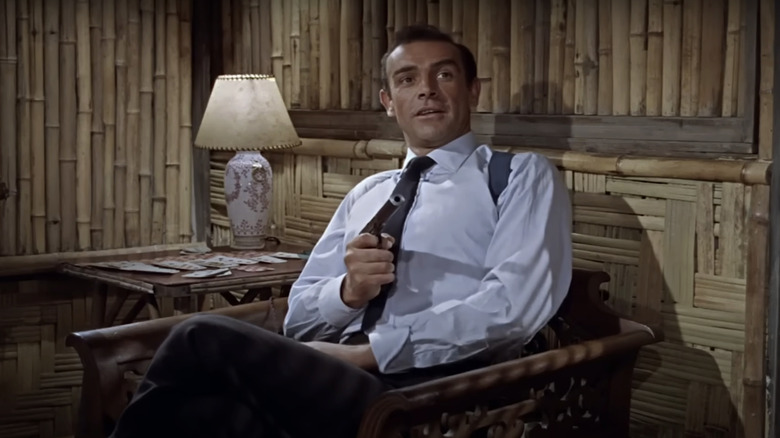
Eon Productions
These days there's a lot of talk about updating 007 for the modern age. James Bond actor Daniel Craig has spoken about there being better parts for women, and "Skyfall" director Sam Mendes thinks there needs to be more women in the director's chair. What's more, for a long time many fans seemed eager to see Idris Elba in the starring role, though that seems increasingly unlikely as we edge closer to the announcement of the new Bond. Either way, there has certainly been more of an effort to reckon with Bond's legacy in recent years, but you'll find none of that in the banned Laserdisc commentaries.
For one thing, "Dr. No" and "From Russia with Love" director Terence Young, without whom Bond would have undoubtedly failed, seemed to treat the commentary tracks like some sort of private conversation with his filmmaking buddies. The director recounts certain behind-the-scenes moments with a colloquial insouciance, noting the films from which he stole certain scenes, including Hitchcock's "North by Northwest" and a sequence that was, in Young's word, "entirely stolen" from "a pretentious picture called 'L'année dernière à Marienbad,' where everybody was wandering down Moonlight paths with sculptures and Christ knows what." This is, however, just the beginning of the unfiltered comments made throughout these audio tracks.
Richard Maibaum thought Ian Fleming was a snob
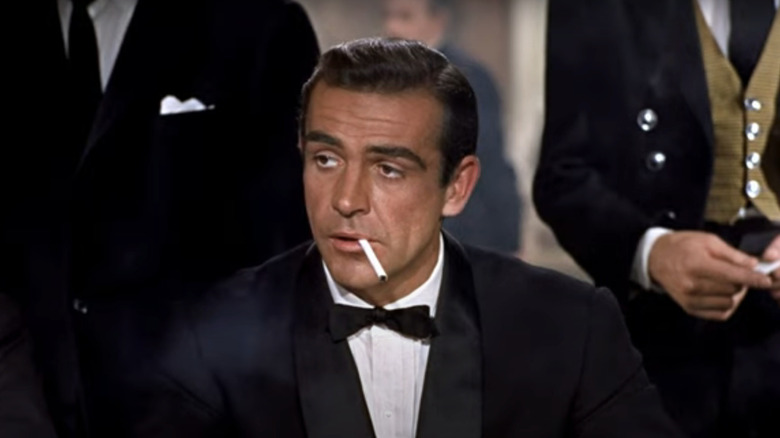
Eon Productions
Beyond revealing which films he stole certain sequences from, Terence Young also recalled a prickly relationship with James Bond creator and author Ian Fleming, who met Young at a party prior to "Dr. No" being filmed. As the director recalled:
"He came across with [original Bond producer, Albert] Cubby Brockley who introduced us, and we were talking for a minute, and he said, 'Ah yes,' he said, 'You're the director, you're the man who's going to spoil my books with your directorial touches.' I said, 'Mr. Fleming I don't know about you, but my last film won the gold medal at the Venice Film Festival. I don't know what prizes your books have ever [won].' He said, 'My God, your a prickly customer aren't you?' and I said, 'No.' I think he was a little bit drunk at the moment."
Young wasn't the only one who seemed to have a difficult relationship with Fleming, either. American writer Richard Maibaum had no problem saying what he really thought of the writer during his segments of the "Dr. No" commentary. Echoing Sean Connery's low opinion of Fleming, the screenwriter says outright, "I had the feeling that Mr. Fleming was a bit of a snob. He just didn't seem very interested in the writing aspects of the things." Maibaum claimed that Fleming "got bored with the books after a while and the books showed it," before recounting a moment when the author approached him during shooting "From Russia with Love." "He did say your screenplays are so much funnier than my books," recalls Maibaum. "I should have told him, 'Because we tried to make them funnier.'"
Sean Connery's weight and sex appeal were a hot topic
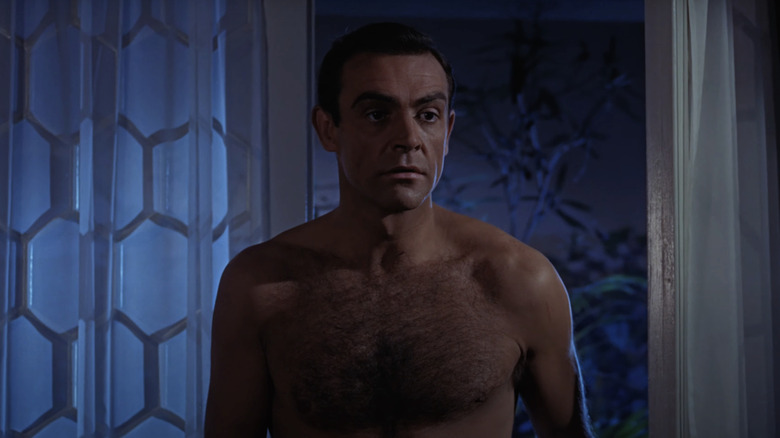
Eon Productions
When he wasn't gossiping about Ian Fleming or revealing from which films he stole, Terence Young was more than willing to comment on Sean Connery's figure. Young talks about the Bond star putting on weight and having to hold his gut in for certain shots in "From Russia with Love." The director says quite openly, "I had to tell [Connery] to keep his stomach in because he was getting very overweight at this time. He had a definite paunch," adding: "Overeating, Sean loves to eat."
That said, Young did take the time to note that, at least for "Dr. No," Connery had "a damn good physique" which he claimed "none of the other [Bond actors] have had." Of course, a certain half-naked beach scene from "Casino Royale" has since become an emphatic refutation of that particular point, but I'm sure other Bond actors would have something to say about Young's observation.
Connery's appearance is a common topic of discussion on the Laserdisc commentaries, with editor Peter Hunt opining that "the greatest thing of all was having cast Sean Connery as James Bond." Why? Because he was, as Hunt puts it "a very sexy man" who possessed a certain quality that Clark Gable also had, namely that they could "walk into a room and f**k anybody."
Guy Hamilton's Goldfinger woes
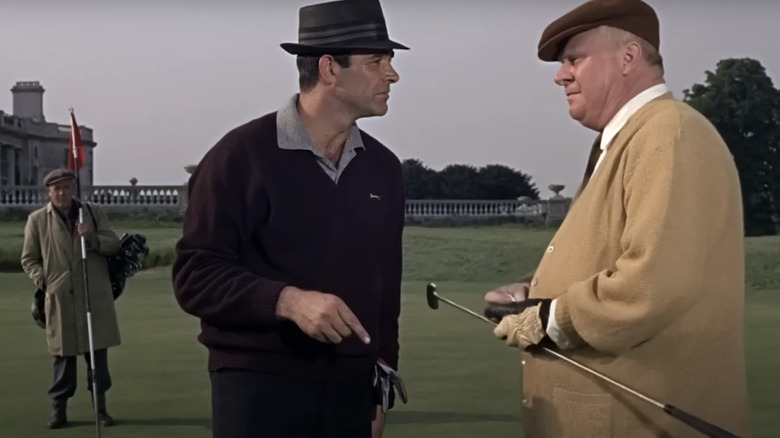
Eon Productions
Though it's often touted as the best James Bond movie, "Goldfinger" wasn't without its difficulties. It's well known that German actor Gert Fröbe, who played Auric Goldfinger, didn't speak English all that well, and had to have his lines overdubbed by British actor Michael Collins. The moment Bond producers Albert "Cubby" Broccoli and Harry Saltzman saw the first dailies from the film is recalled on the commentary tracks by director Guy Hamilton, who claims the pair "went ape" because Fröbe was speaking "total gibberish."
Hamilton also tears apart a sequence in "Goldfinger," announcing a car chase as "something I screwed up." The director claims the whole sequence "doesn't work," and says he "hate[s] the whole thing."
It wasn't just Hamilton that hated aspects of "Goldfinger" either. It turns out Sean Connery wasn't a big fan of the moment Harold Sakata's Oddjob crushes a golf ball with his bare hands. According to Hamilton, the actor thought the whole idea was "ridiculous," saying, "Nobody could squash a golf ball." In response, the director said, "But that's the whole point, Sean. It's obvious by now that before the picture's over you and Oddjob are going to tangle, so you're going to be fighting a man who can squash golf balls amongst other things," to which Connery apparently said, "I still say it's rubbish. It'll earn up on the cutting room floor," which it absolutely did not.
The James Bond commentaries get more shocking as they go on
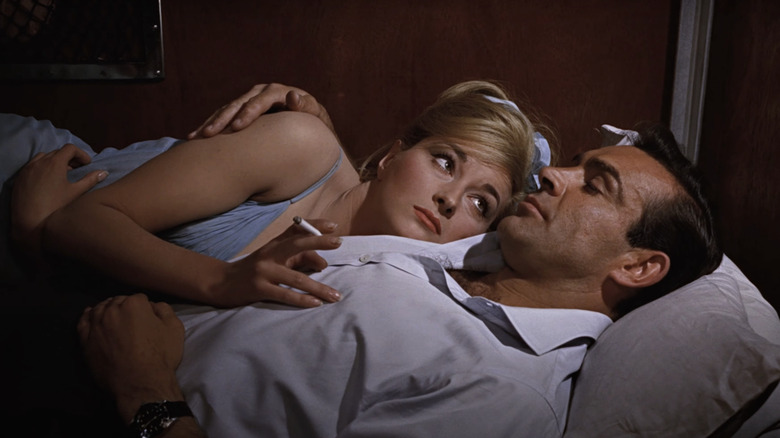
Eon Productions
When he wasn't talking candidly about Sean Connery's weight, Terence Young used his commentary track to chat about how he'd try to use pretty girls for everything he could. "We always had a girl doing the desk clerk," he says during a scene in "From Russia with Love." "Whatever it is, if a girl could do it, a girl did it, you know, and especially a pretty girl." But one of his more hilariously candid moments comes when he discusses "From Russia with Love" actress Lotte Lenya, who played Russian military colonel and SPECTRE board member Rosa Klebb. During a scene featuring the actress, Young says, "She was about 70 there, and she was screwing like mad when she was about 80. She's a great lady. I used have lunch with her every time I came through New York it was very interesting."
As the commentaries go on, more shocking revelations are divulged with relative equanimity, such as when Peter Hunt talks about a scene in "From Russia with Love" which ended up costing a cameraman a limb. The editor nonchalantly recalls, "I'm afraid we lost the rotary arm. [It] went through the foot of our cameraman, and [...] he eventually lost his foot, I'm afraid they had to amputate it after a lot of trying to keep it. Helicopter shooting is very dangerous." That's that, then.
There are plenty more less hilarious and more upsetting comments made throughout the lost James Bond commentaries, which are more a representation of the unfortunate societal norms of the time than anything else. Still, these banned audio tracks reveal a fascinating insight into how some of the finest films in action history were made, and more specifically how the people making them were thinking. If you can put up with some outdated thoughts from what Judi Dench's M would have called "relics of the Cold War," then, these lost commentary tracks are a must-listen for any James Bond fan.

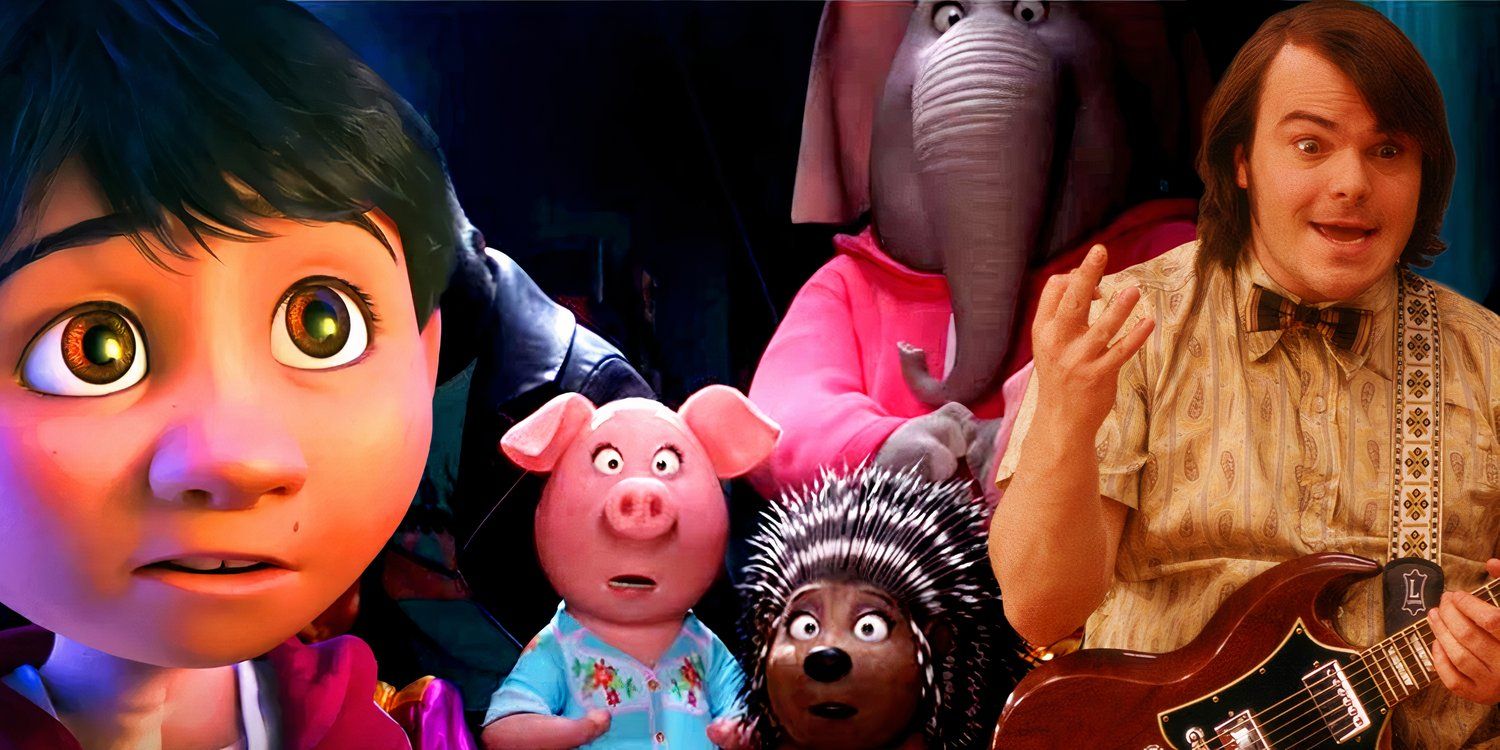







 English (US) ·
English (US) ·